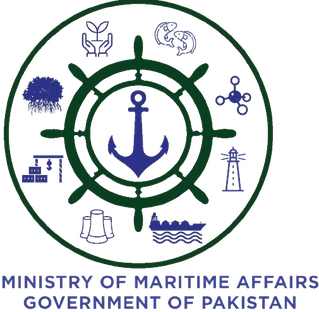
A highway patrol is a police unit, detail, or law enforcement agency created primarily for the purpose of overseeing and enforcing traffic safety compliance on roads and highways within a jurisdiction. They are also referred to in many countries as traffic police, although in other countries this term is more commonly used to refer to foot officers on point duty who control traffic at junctions.

The Indus Highway, also known as National Highway 55 (N-55), is a 1264 km long two to four-lane national highway that runs along the Indus River in Pakistan connecting the port city of Karachi with the northwestern city of Peshawar via Dera Ghazi Khan. It is part of Pakistan's national highways network and is maintained and operated by National Highway Authority of Pakistan. The Indus Highway passes through the Kohat Tunnel.

National Highways of Pakistan are a network of toll highways in Pakistan, which are owned, maintained and operated by the National Highways Authority under the Ministry of Communications. It maintains 12,131 kilometres (7,538 mi) of roadways organized into various classifications which crisscross the country and provide access to major population centers. National Highways are not to be confused with provincial highways, which are roads maintained by the respective provinces. Pakistan's national highways include the famous Grand Trunk Road, Indus Highway, Karakoram Highway and Makran Coastal Highway. All national highways in Pakistan are pre-fixed with the letter 'N' followed by the unique numerical designation of the specific highway, e.g. "N-5". Each numerical designation is separated by five numerals, i.e. N-5, N-10, N-15, etc. National Highways are distinct from Strategic Highways, which begin with the prefix 'S' and are controlled and operated by the Ministry of Defence.
A highway authority is a government organization responsible for public roads.

The M-9 motorway or the Karachi–Hyderabad motorway is a north–south motorway in the Sindh province of Pakistan, connecting Karachi to Hyderabad. The six-lane road is 136 kilometres long, and caters to the commercial traffic originating from the Karachi Port and Port Qasim. Daily traffic count is around 30,000.
Motorways of Pakistan are a network of multiple-lane, high-speed, controlled-access highways in Pakistan which are owned, maintained, and operated federally by Pakistan's National Highway Authority. At present, 2567 km of motorways are operational, while an additional 1191 km are under construction. Motorways are a part of Pakistan's “National Trade Corridor Project” and “China-Pakistan Belt Road Initiative,” from Khunjerab Pass near the Chinese border to Gwadar in Balochistan. There are a total of 16 motorways, 11 of which are operational, while some are under construction and others are planned.
Law enforcement in Pakistan is one of the three main components of the criminal justice system of Pakistan, alongside the judiciary and the prisons. The country has a mix of federal, provincial and territorial police forces with both general and specialised functions, but the senior ranks of all the provincial forces and most of the federal ones are manned by members of the Police Service of Pakistan (PSP). The PSP is one of the most prestigious part of the Central Superior Services, Pakistan's main civil service organisation. Federal law enforcement agencies are generally overseen by the Ministry of Interior of the Government of Pakistan, while provincial police forces are overseen by a department of the government of that province.

The Ministry of Communications, is a Cabinet-level ministry of the Pakistani Government responsible for analysing, formulating and implementing central policy on communications and transportation. It is one of the oldest ministries, created on 14 August 1947. The Ministry of Communications has jurisdiction over telegraph and telephone communications as well as public radio, technical means of radio and television broadcasting and the distribution of periodicals. The Ministry and its political executive, the Communications Minister, are headquartered in the Cabinet Secretariat, Islamabad Capital Venue. The Communications Minister is a public appointee who must be a member of Parliament.

The Cabinet of Pakistan is a formal body composed of senior government officials chosen and led by the Prime Minister. All cabinet members sworn in are designated Minister and are seated at their respective ministries located in the Pakistan Secretariat.

The National Highway Authority is a statutory body under the Ministry of Communications of Pakistan.

The Ministry of Interior is a Cabinet-level ministry of the Government of Pakistan, tasked and primarily responsible for implementing the internal policies, state security, administration of internal affairs involving the state.
Expressways of Pakistan are a network of multiple-lane, high-speed toll highways in Pakistan, which are owned, maintained and operated by various levels of government. All federal expressways are controlled by the National Highway Authority, while others are provincially and municipally controlled. Expressways are usually higher grades than national highways, but differ from motorways by having fewer access restrictions. All federal expressways are pre-fixed with the letter 'E' followed by the unique numerical designation of the specific highway.
The Islamabad Capital Territory has five major types of roadways i.e. expressway(s), highway(s), avenues, khayabans, and roads. The Capital Development Authority's Engineering Wing, under the Ministry of Transportation, maintains over 2,000 kilometres (1,200 mi) of roadways organised into various classifications which crisscross the territory. These are not to be confused with national highways, which are federal roads maintained by the National Highway Authority, Government of Pakistan.
Allah Dino Khawaja is a retired Pakistani police officer who serves in BPS-22 grade as the Federal Secretary for Ministry of Human Rights. A.D Khawaja is batchmates with prominent bureaucrats namely Fawad Hasan Fawad (PAS), Rizwan Ahmed (PAS), Sikandar Sultan Raja (PAS) and Hussain Asghar (PSP).

The Ministry of Maritime Affairs, previously known as the Ministry of Ports and Shipping, is a Federal Ministry of the Government of Pakistan. The current Minister for Maritime Affairs is Qaiser Ahmed Sheikh and the current Federal Secretary for Maritime Affairs is Zafar Ali Shah. The longest-serving Federal Secretary for Ports and Shipping are Muhammad Saleem Khan and Rizwan Ahmed. The Ministry is headquartered in Islamabad and its main attached departments are in the port city of Karachi.

The Federal Secretary is the highest-ranking position in the Government of Pakistan, occupied by the most senior civil servant in a specific ministry or division. The secretary is the administrative head of that ministry or division and oversees and enforces public policy matters. The authority for the creation of this post solely rests with the Cabinet of Pakistan. The position holder is a BPS-22 grade officer, usually belonging to the Pakistan Administrative Service.
Jawad Rafique Malik is a retired officer of Pakistani civil service who served in BPS-22 grade as Chief Secretary Punjab and Federal Secretary of the Kashmir Affairs and Gilgit-Baltistan Division. Hailing from Lahore, Malik belongs to the Pakistan Administrative Service and is batchmates with Fawad Hasan Fawad, Rizwan Ahmed, Sikandar Sultan Raja and Shoaib Mir Memon.

Syed Kaleem Imam is a retired Pakistani police officer who has served as I.G Motorway & Highway Police, IG Punjab and Federal Secretary of Ministry of Narcotics Control.
Khyber Pass Economic Corridor (KPEC) is an infrastructure project that aims to expand Pakistan's economic connectivity with Afghanistan, and by extension Central Asia, via the Khyber Pass. The project was approved for construction in December 2019 by Pakistan and the World Bank at an expenditure of $482.75 million.

Captain (R) Shahid Ashraf Tarar is a BPS-22 Pakistani civil servant who has served as Caretaker Federal Minister for Communications, Maritime and Railways from 17 August 2023 to 4 March 2024. His career spans various senior roles including Chairman National Highway Authority and Federal Public Service Commission. Notably, he was appointed as the Executive Director of the World Bank Group on behalf of seven countries including Pakistan. Prior to his civil service, Tarar served in the Pakistan Army, retiring with the rank of Captain.








